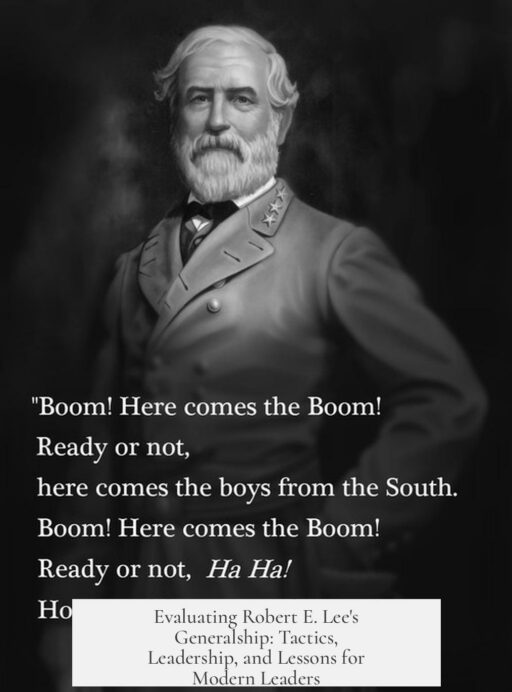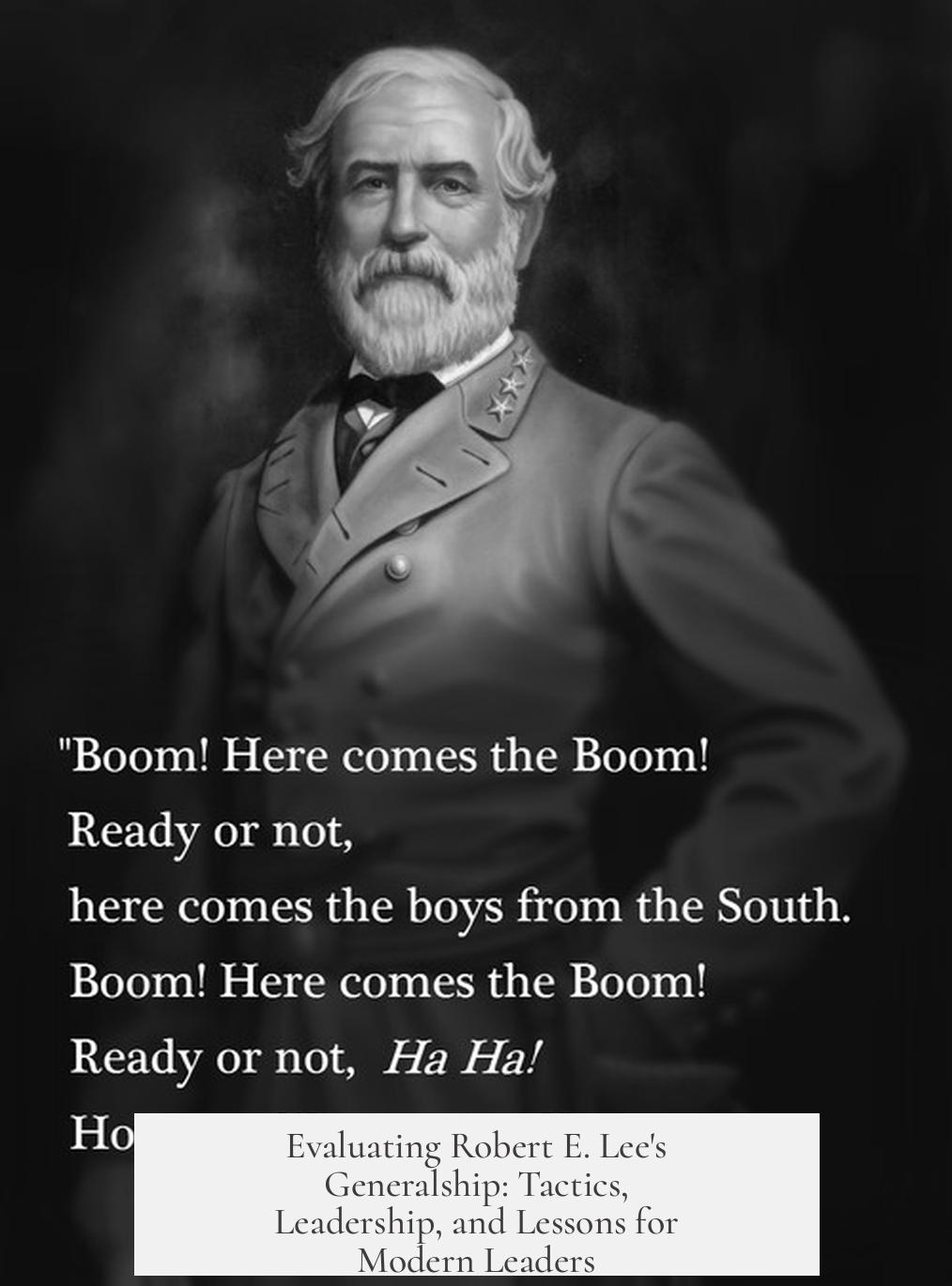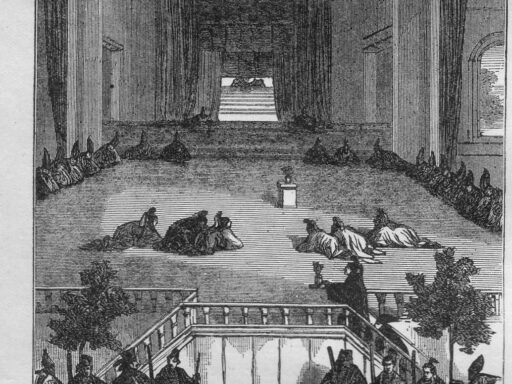Robert E. Lee was a very good general, known for his tactical skill, strategic insight, and battlefield achievements, though he exhibited notable flaws that affected his command and contributed to his ultimate defeat.
Lee’s reputation as a military commander ranks him among history’s great generals. He showed exceptional intelligence and discipline from an early age. His ability to learn and apply military knowledge proved critical throughout the Civil War. Lee demonstrated outstanding leadership in key battles such as Fredericksburg, Chancellorsville, and the Second Battle of Manassas (Bull Run), where his command contributed directly to major Confederate victories. Tactically, he was both daring and effective. Strategically, Lee understood the broader context of the war and sought to weaken Northern resolve by pressuring Union forces in key invasions during 1862 and 1863.
Lee’s command style merged tactical brilliance with political awareness. He coordinated artillery, cavalry, and infantry into cohesive operations despite the Confederacy’s logistical disadvantages. This coordination reflected his sharp intellect and leadership ability. Holding limited resources, Lee was able to maximize Confederate strengths and exploit enemy weaknesses. His understanding of both battlefield maneuvers and overarching war aims added depth to his generalship.
However, Lee’s performance was not without significant shortcomings. Some historians argue that his obsession with destroying the Union’s Army of the Potomac led him to accept high Confederate casualties unnecessarily. At Antietam, for example, Lee refused to disengage even while sustaining unsustainable losses. The close outcome of that battle was helped more by Union mishandling than Confederate strength.
Another weakness was Lee’s command style, particularly at Gettysburg, arguably his most famous defeat. Lee distrusted most of his subordinates except Stonewall Jackson, his close confidant. This led to micromanagement and poor delegation. Lee often gave vague orders, leaving generals like Ewell to interpret crucial commands under pressure. On the second day at Gettysburg, this indecision and lack of clear authority contributed to missed opportunities, allowing Union forces to regroup and resist.
Lee’s refusal to embrace advice also hurt his chances. Longstreet, a senior lieutenant, warned against launching a frontal assault at Gettysburg and suggested flanking maneuvers instead. Lee dismissed this advice, leading to the failed Pickett’s Charge and a costly Confederate loss. Additional problems like Stuart’s absence and Lee’s surprise at Union positions revealed gaps in intelligence and battlefield awareness under his leadership.
Lee also showed tunnel vision regarding geography. He insisted on defending and fighting in Virginia rather than consider shifting theaters like Tennessee, which some argue reduced Confederate strategic flexibility. A general’s ability to adapt locations is critical, and Lee’s rigidity limited his options.
The significance of logistics and opposing leadership helps round out the assessment of Lee’s capabilities. His ultimate opponent, Ulysses S. Grant, was not a flawless tactician but excelled at modern warfare’s demands. Grant understood logistics—troop supplies, reinforcements, and extended campaigns—better than Lee. Grants’s persistence in grinding campaigns such as the Overland Campaign and the Siege of Petersburg stretched Confederate resources thin. Refusing to retreat despite heavy losses was a key factor that wore down Lee’s army and exposed its vulnerabilities.
Grant’s strategy of continuous engagement and maneuvering forced Lee into defensive battles that depleted his manpower and stores. Lee’s aggressive tactics met a patient and better-supplied enemy, eroding the Confederacy’s capacity. This protracted conflict showed Lee’s limits when faced with a general capable of leveraging superior resources and logistics on the battlefield.
Thus, Lee was an excellent general, tactically adept, and strategically aware, but his shortcomings in command delegation, adaptability, and handling of personnel limited his effectiveness. His flaws became more pronounced under the sustained pressure applied by Grant and the Union armies.
He was not a perfect general but remains one of the Civil War’s most skilled commanders. His battlefield successes reflect clear military talent. His ultimate defeat resulted from a combination of personal command limitations and the overwhelming material and logistical advantages enjoyed by the Union-led forces.
- Robert E. Lee was tactically and strategically gifted, winning key battles despite Confederate disadvantages.
- His aggressive style sometimes led to high casualties, notably at Antietam and Gettysburg.
- Lee’s mistrust and micromanagement limited his generals’ effectiveness.
- His refusal to delegate clear orders contributed to failures in critical moments.
- Lee’s strategic rigidity, refusing to fight outside Virginia, reduced Confederate options.
- Grant’s mastery of logistics and persistence exposed Lee’s limitations in sustained campaigns.
- Lee was an outstanding but flawed general, not merely defeated by Northern resources but by a combination of factors including his own mistakes.
Was Robert E. Lee Actually a Good General? A Closer Look at the Man Behind the Legend
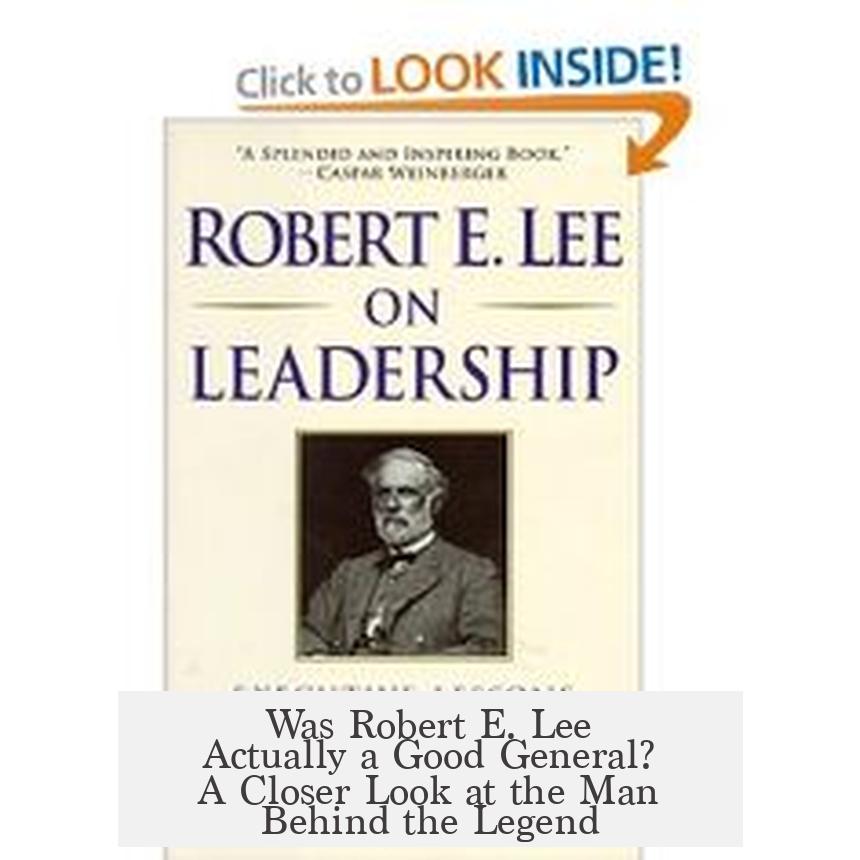
Short answer: yes, Robert E. Lee was an outstanding general who is rightly held in high regard amongst history’s greatest military commanders and tacticians. But history is rarely simple, and Lee’s legacy as a Civil War general is wrapped in both accolades and controversies. So, what makes Robert E. Lee a “good” general? And what were his flaws? Buckle up. Let’s dissect this fascinating military figure.
The Tactical Wizardry and Strategic Mind of Lee
Imagine commanding an army with fewer soldiers, poorer supplies, and a scrambling infrastructure compared to your rival. That was Lee’s reality leading the Confederate Army. Yet, from the get-go, Lee displayed an alarmingly sharp intellect. As a young man, he soaked up military theory and practiced discipline like a true student of warfare.
On the battlefield, Lee’s name quickly became synonymous with clever, daring tactics. At battles like Fredericksburg, he orchestrated a crushing defensive victory by maximizing terrain advantages and coordinating his artillery, cavalry, and infantry like a perfectly tuned orchestra. The result? Devastating losses for the Union.
But Lee wasn’t just a defensive genius. Consider Chancellorsville and 2nd Manassas—here Lee went on the offensive with bold maneuvers that flummoxed Union commanders. What many miss is his strategic vision, knowing that the Confederacy could win not necessarily by crushing the Union army outright, but by grinding down the North’s will to fight. His northern invasions in 1862 and 1863 weren’t random acts of bravado but carefully considered campaigns to destabilize political resolve in Washington.
Even with all these accomplishments, Lee faced enormous handicaps. His supply lines were thin, the Confederate government’s support was patchy, and still, he managed to make his army a formidable force. The doubters say he had luck on his side. But chance alone doesn’t explain how he consistently outmaneuvered better-equipped foes.
Lee’s Leadership Style: The Double-Edged Sword
However, no general is flawless. Lee’s strengths were coupled with some critical weaknesses. One notable flaw was his obsession with destroying the Army of the Potomac at all costs. This single-minded focus sometimes led to reckless decisions regarding casualties among his own men. Think: Antietam.
“Lee refused to disengage from battle despite unsustainable losses, nearly leading to total annihilation — had it not been for Union mistakes.”
His refusal to retreat also contributed to Confederate losses that could have been minimized. And then there’s Gettysburg, arguably Lee’s most famous failure. Was it a fluke? Experts disagree. Some, like historian Gallagher, argue it exposes Lee’s limitations as a commander.
Lee notoriously distrusted his generals, except perhaps Stonewall Jackson, whom he deeply respected. Instead of delegating, he gave orders directly—sometimes vague and open to interpretation. This created communication breakdowns that cost dearly.
- At Gettysburg’s second day, failure to allow General Longstreet to execute his planned flanking maneuver deprived Lee of a tactical advantage that might have turned the tide.
- Similarly, Lee’s ambiguous instructions to General Ewell led to a hesitant attack instead of a decisive one, allowing Union forces time to regroup.
Compounding these issues was Lee’s narrow focus on Virginia, refusing to deploy his army to other critical theaters like Tennessee. A good general adapts to broader strategic needs, but Lee often clung to his home turf. Was this loyalty or stubbornness? Likely a bit of both.
Logistics: The Hidden Backbone—and Lee’s Achilles’ Heel
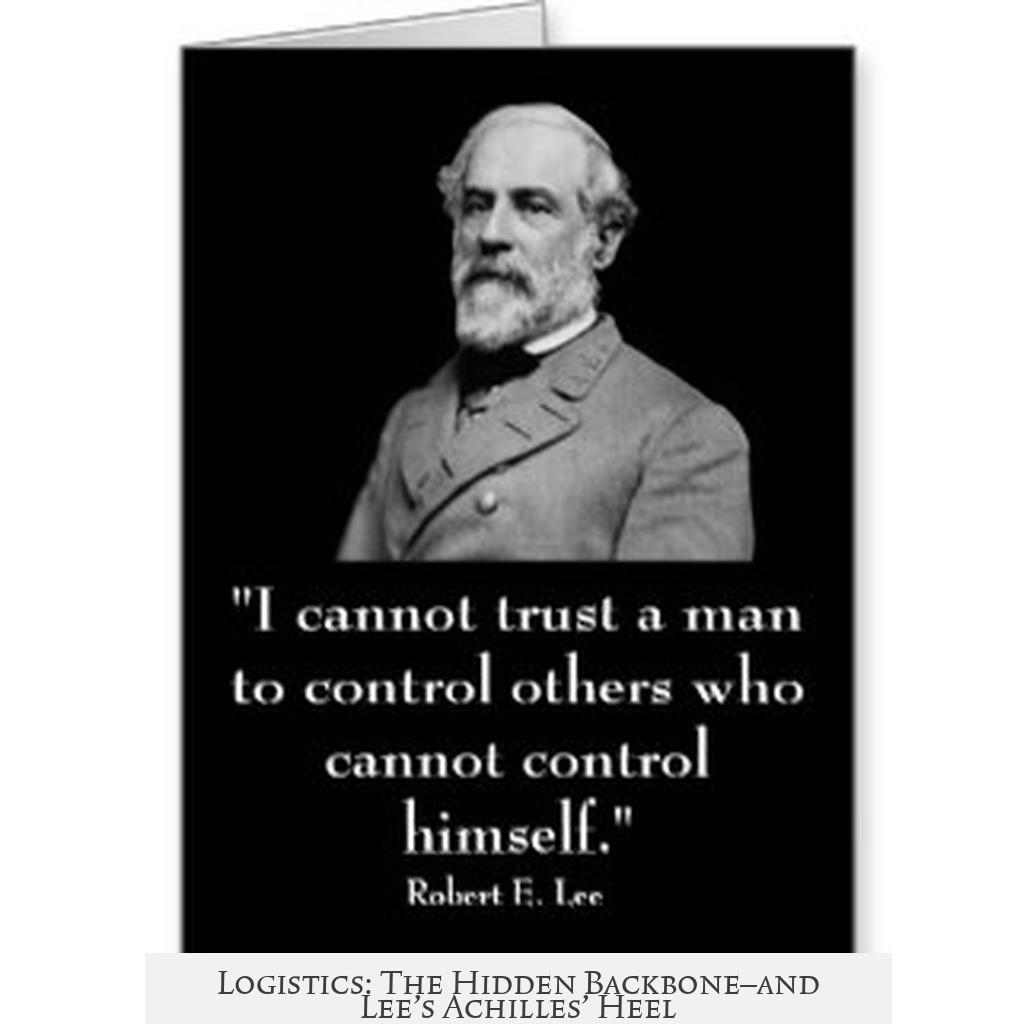
Here’s where Lee meets his match: logistics. Unsexy but crucial. The North’s General Ulysses S. Grant understood this better than Lee, embodying a modern general’s mindset. Grant wasn’t a dazzling tactician—his record has several blunders—but he mastered the art of sustaining prolonged campaigns.
Grant grasped that the Confederate army’s steel resolve wasn’t enough to win. Exhausting Lee’s soldiers and resources would. That is precisely what Grant did through the Overland Campaign and the grueling siege of Petersburg and Richmond.
Unlike Lee, Grant refused to back down after costly battles. Instead, he continuously outflanked Lee, stretched Confederate forces thin, and maintained pressure until Lee’s defensive lines finally broke. Once Lee evacuated Richmond, the war practically ended.
Grant’s strategy wasn’t about flashy tactics but attrition, supply lines, and relentless engagement — a modern warfare blueprint that Lee was never able to counter effectively.
This battle of endurance exposed Lee’s critical limitations in manpower and supply. Despite his tactical brilliance, he couldn’t overcome the logistical disadvantage. And in war, logistics tend to be the silent kingmaker.
So, Was Lee a Good General?
Summing it all up, Robert E. Lee was indeed an exceptional general, with a tactical mind few have matched. His ability to coordinate diverse military divisions in adverse conditions speaks volumes about his command capabilities.
Yet, he was human—and his flaws mattered. His stubbornness, overconfidence in his army’s invincibility, communication gaps, and failure to adapt strategically beyond Virginia’s borders were fatal. The fact that Lee was ultimately defeated was not just because Northern resources overwhelmed him, as Lost Cause proponents argue, but because his weaknesses were exploited masterfully by Grant’s modern approach.
T.D.;L.R: Lee was a formidable general—outstanding in many aspects but not without shortcomings that contributed to the Confederacy’s downfall.
What Can Modern Leaders Learn from Lee?
Looking beyond the battlefield, Lee’s story offers some fascinating leadership insights.
- The Power of Intellect and Preparation: Lee’s early dedication to mastering military knowledge paid tremendous dividends.
- The Danger of Micromanagement: His refusal to delegate effectively hampered operational flexibility, a lesson applicable in boardrooms everywhere.
- Strategic Adaptability Matters: Sticking to a narrow focus—even if it’s your comfort zone—can be a serious liability.
- Logistics Are King: No matter how brilliant your strategy, if your supply chain falters, you’re doomed.
Could Lee have won if he better embraced these lessons? History says maybe, but the Civil War’s tides were complex, shaped by many factors beyond any one man’s control.
Final Thoughts
Robert E. Lee’s name still commands respect, both for his prowess and the tragedy of his cause. As a general, his brilliance shines through some of the Civil War’s most critical battles. But he was no infallible legend. His flaws and failures remind us that even the best generals are human—fallible, constrained, and shaped by their times.
Next time you hear someone debate whether Lee was “actually a good general,” you’ll know the nuanced answer. It’s complicated. He was great, but not perfect. A mind to admire, yes, but also a man whose mistakes echo through history.
So, was Robert E. Lee a good general? Undoubtedly yes—an outstanding tactician and strategist who, like all of us, was imperfect.
